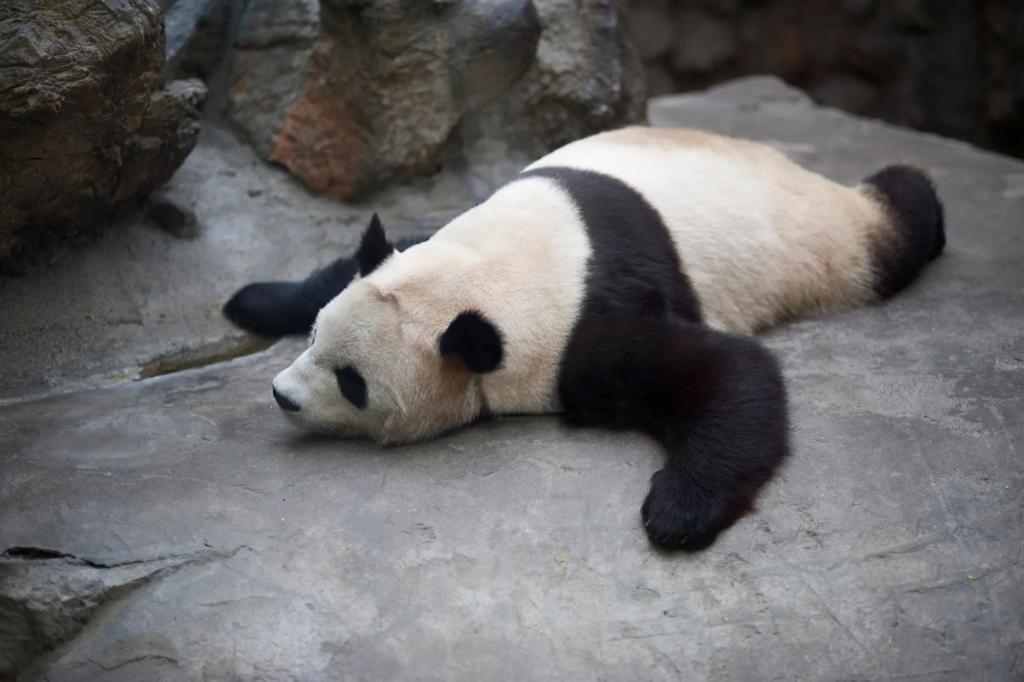Giant pandas living in captivity may experience a form of “jet lag,” according to a new study.
Animals, like humans, have a circadian rhythm – an internal body clock that is controlled by signals from the environment and determines when to perform certain activities, such as sleeping and eating.
But when environmental cues don’t match their natural habitat, pandas may start to behave more erratically — which could negatively impact the already endangered species, according to a study published Monday in the journal Frontiers in Psychology.
“Animals, including humans, have evolved rhythms to synchronize their internal environment with the external environment,” study lead author Kristine Gandia, a PhD student at the University of Stirling in Scotland, said in a statement.
“When the internal clock is out of sync with external cues such as light and temperature, animals suffer adverse effects,” he said. “In humans, this can range from jet lag to metabolic problems to seasonal affective disorder.”
He said he was looking, with 13 other scientists, to see how changes from their natural environment would affect giant pandas, explaining to CNN that jet lag occurs when there is “a potential lack of ability to fully adapt to environmental conditions and cues.” — not because someone changed the time zone.
Gandia said he and his team decided to focus on the effects of environmental change on giant pandas because they live a cyclical lifestyle – migration occurs in the spring because pandas eat certain types of bamboo and need to find shoots. Mating also takes place in the spring.
 A team of 13 psychologists concluded that giant pandas held in captivity may be experiencing a form of “jet lag.” NurPhoto via Getty Images
A team of 13 psychologists concluded that giant pandas held in captivity may be experiencing a form of “jet lag.” NurPhoto via Getty Images
Their treatment in captivity also fits the study, Gandia said.
“Pandas are very good animals to focus on. They are very popular in zoos, and there are many that have ‘panda cameras’ so we can see how their behavior changes across different latitudes,” he explained.
The researchers monitored 11 giant pandas in six different zoos around the world, all of which were born in captivity.
The study did not specify which zoos the researchers were examining the giant pandas in, but it was divided between those at the same latitude as their natural habitat in China and those outside that range.
As part of the study, observers watched the pandas every month for a year, noting how their behavior changed.
 The researchers studied 11 giant pandas in six different zoos around the world, all born in captivity, for a year.Getty Images/iStockphoto
The researchers studied 11 giant pandas in six different zoos around the world, all born in captivity, for a year.Getty Images/iStockphoto
“We recorded essentially the entire repertoire of behavior of giant pandas, trying to account for positive, neutral behaviors and negative indicators of welfare,” Gandia told CNN.
“So this includes behaviors such as playing, grooming and sexual-related behaviors as positive behaviors; and drinking and defecating as neutral animal behavior; and some abnormal/stereotyped behaviors as negative behaviors – with pacing being the most common,” he explained in an email to CNN.
13 researchers found that each panda displays three times the peak activity in a 24-hour period, including nighttime, as they do in their natural habitat.
Sexual behavior was only recorded during the day in adult pandas, which is likely an easier time for them to find mates in the wild.
But those living in captivity outside their home latitudes are less active, with Gandia speculating that it may be because the time of day and temperature cues differ from their natural habitat.
“When giant pandas are housed at higher latitudes – meaning they experience more extreme seasons than they grew up in – this changes the general level of activity and abnormal behaviour,” he said.
Categories: Trending
Source: thtrangdai.edu.vn/en/



